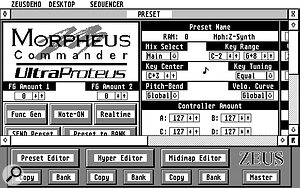 The main page of MidiGen, showing a selection of the current Set's Generators.
The main page of MidiGen, showing a selection of the current Set's Generators.
Derek Johnson rounds up the latest Atari news and software availability.
<!‑‑image‑>If there's one thing that algorithmic composition tools have in common (and lots are available for the Atari), it's that they each do their job slightly differently, and often have unique features. This is certainly the case with the freeware MidiGen, written by Petra Wolf and Joker Nies for their own use as a live, improvising tool (or, as Joker says, "I use it for abstract soundsculptures, not as a sequencer source").
Here's The Gen
 A MidiGen Generator editor page, reached by double‑clicking on any Generator in a Set.
A MidiGen Generator editor page, reached by double‑clicking on any Generator in a Set.
MidiGen is a complex program that started life as a MIDI‑event generator, but grew until it became the comprehensive performance aid it is today. Essentially, MidiGen offers six Sets of 21 'Generators', each of which can send data on up to four MIDI channels; only one Set can be active at any one time. A multitude of user‑tweakable parameters within each generator determines the program's output, in terms of note and controller data. This is, initially at least, a hit‑and‑miss affair, but if you're into this kind of software you'll be used to prodding parameters and dialogue boxes with your mouse to see what happens. There is no manual (though there are plans to produce one), but Joker provides a brief overview of MidiGen's operation at sites.netscape.net/timconrardy/joker.htm. Also be aware that much of the busy but well‑laid‑out user interface is in German, though it doesn't take a modern languages degree to work out that 'Ausgabe Midikanal' is simply telling you where to set a MIDI Out channel. Most other terms are equally explicable; in any case, Joker's overview is in English and should get you over any initial humps.
<!‑‑image‑>It seems that MidiGen's algorithms generate both MIDI note and controller data in much the same way: randomly, and/or within a user‑definable interval range, with ascending, descending, ascending/descending and permutational orders. In addition, note generation is influenced by a number of other functions. For example, it can be set to play with a 12‑tone rule (no one note will be repeated until the other 11 have played first), and it's possible to generate sub‑semitone intervals, in which case MidiGen uses pitchbend data to generate quarter‑, eighth‑ and 16th‑tone intervals. That's a rare feature on any platform. There is user control over generated note lengths (though nothing is completely predictable in this program), as well as program changes. Though polyphony is five voices per MIDI channel, a 'mono' option is available for if you're driving monosynths from the program. There is a certain amount of MIDI File Format compatibility, so work done in MidiGen could be moved to other sequencers if desired. All in all, it's an intriguing program worthy of some exploration.
groups.yahoo.com/group/atari‑midi/files/jokermidi/
On‑line Action
 The main page of Zeus, the Morpheus/Ultra Proteus librarian for Atari.
The main page of Zeus, the Morpheus/Ultra Proteus librarian for Atari.
Proof of the dynamic nature of on‑line publishing doesn't come any clearer than this: I mentioned the latest editions of the MyAtari on‑line Atari magazine in the last column, but at the time the May issue didn't contain anything specifically musical. It does now, in the form of an article by Neil Wakeling, author of Pulsar, the ST analogue‑style sequencer simulation, describing his software. The software has been featured a couple of times in this column, and it's worth mentioning that a beta version of the forthcoming update (v1.53) to Pulsar, with new graphics and features, is downloadable from sites.netscape.net/ timconrardy/pulsar.htm. If you'd like to play it safe, the last official update (v1.42) can be found at www.tuva.demon.co.uk/atari.htm#p.... And absolutely at the end of me putting together this column, the June issue of MyAtari has been placed on line.
Anodyne Update
Hot on the heels of last month's quick run‑down of developments at Anodyne Software, we hear that the ExtenDOS Gold CD ROM/CDR utility is now up to v3.3d. This update offers a range of bug fixes and interface enhancements, and is free from Anodyne's web site. An update is also imminent for the company's CD Writer Suite: support for MP3 files and backup for partitions larger than 650Mb is promised.
www.atari‑workshop.co.uk
Atari Ed/Lib!
<!‑‑image‑>Petra Wolf and Joker Nies, authors of the MidiGen software featured in the main body of this column, are also behind two freeware synth editors running on the Atari. First of all, there's Zeus, an editor/librarian for Emu's Morpheus and Ultra Proteus. Secondly, there's Prophy, a librarian for Korg's Prophecy physical modelling monosynth that can run as a stand‑alone program or as a desk accessory. Both programs work on most flavours of Atari and should be compatible with multitasking operating systems.
groups.yahoo.com/group/atari‑midi/files/jokermidi/
